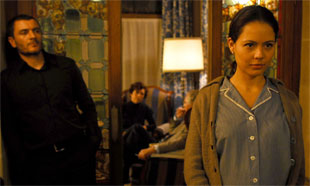Rabia
Director Sebastian Cordero’s third film, “Rage” (“Rabia”), follows two immigrants in a hostile, xenophobic Spain as they try to scrape together a living. After José Maria (Gustavo Sanchez Parra), the origin of the eponymous rage, accidentally kills his boss on a construction site, he takes refuge inside the huge mansion where Rosa (Martina Garcia) works as a housekeeper. The rest of the film follows Rosa’s travails as José Maria silently watches, starving in the shadowy attic, until they’re finally reunited.
Although Cordero’s film ends rather predictably, its strength can be found in its period of limbo, during which Rosa doesn’t know what’s happened to her boyfriend or what she’s going to do with her life. Her feelings of uncertainty only get worse after she discovers she’s pregnant (by José Maria), and gets raped by her rich employers’ son (who, of course, is punished in due course). Garcia’s performance is nicely understated–unaware that her paramour is watching her every move, she feels more and more isolated and alone.
The cinematography in “Rage” is one of the primary reasons that the film succeeds as a thriller, albeit a not terribly scary one. The mansion’s interiors are often shot in very low light, which gives them an air that is both stately and slightly menacing. Though Guillermo Del Toro produced “Rage,” (after producing another, much scarier haunted-house film called “The Orphanage” a few years ago) there is none of the usual special-effects madness here that populates his films. Instead, “Rage” is almost serene in some places; the tension that drives the narrative exists more because of its characters’ longing for each other than because of any overt threat or impending cataclysm.
Cordero has also gone out of his way in this film to craft characters that are purposefully three-dimensional; even the rich wife who bosses Rosa around at first eventually shows a softer side and ends up becoming the girl’s savior once she realizes she’s expecting. Other screwed-up members of the wealthy family demonstrate that the good life often isn’t really all that good, and Rosa and José Maria, with their utterly simple existence, begin to look much more like the ideal couple.
Cordero’s subtlety as both a screenwriter (“Rage” is adapted from a book by Argentine crime novelist Sergio Bizzio) and a director will certainly serve him well in his future endeavors—I just wish “Rage” had a bit more tang.
news via inbox
Nulla turp dis cursus. Integer liberos euismod pretium faucibua



